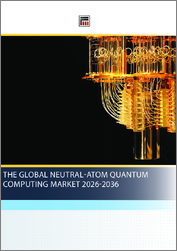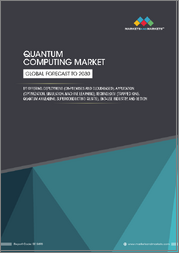
|
시장보고서
상품코드
1661796
양자 컴퓨팅 시장 보고서 : 동향, 예측, 경쟁 분석(-2031년)Quantum Computing Market Report: Trends, Forecast and Competitive Analysis to 2031 |
||||||
세계 양자 컴퓨팅 시장의 미래는 최적화, 시뮬레이션, 머신러닝 애플리케이션의 기회로 인해 유망합니다. 세계 양자 컴퓨팅 시장은 2025년부터 2031년까지 36.8%의 연평균 성장률(CAGR)로 2031년까지 약 106억 달러에 달할 것으로 예상됩니다. 이 시장의 주요 촉진요인은 고성능 컴퓨팅에 대한 수요 증가와 다양한 산업 분야의 양자 컴퓨팅 솔루션에 대한 수요 증가입니다.
- Lucintel의 예측에 따르면, 배포 카테고리에서 클라우드는 유연성과 강력한 시스템으로 인해 사용자들 사이에서 클라우드 사용이 증가함에 따라 예측 기간 동안 높은 성장이 예상된다고 합니다.
- 응용 분야에서는 양자 알고리즘이 문제를 최적화하고 보다 신속하고 효율적으로 해결하기 위해 사용되고 있기 때문에 최적화 분야가 가장 큰 비중을 차지할 것으로 예상하고 있습니다.
- 지역별로는 국방, 의료, 제약, 에너지 및 전력 등 다양한 분야에서 양자 컴퓨팅이 광범위하게 적용되고 있어 예측 기간 동안 APAC 지역이 가장 큰 지역으로 남을 것으로 예상됩니다.
양자 컴퓨팅 시장의 전략적 성장 기회
양자 컴퓨팅 시장에는 다양한 응용 분야에 걸쳐 전략적 성장 기회가 존재합니다. 양자 기술의 발전과 함께 성장과 진화가 필요한 분야가 많이 있습니다. 이러한 격차를 해소하는 것은 시장을 확대하는 것뿐만 아니라 양자 컴퓨팅의 잠재력을 실현하는 데에도 도움이 될 것입니다.
- 최적화 및 공급망 관리 : 양자 컴퓨팅의 활용은 최적화 및 공급망 관리 분야에서 전략적 성장 기회를 제공합니다. 양자 알고리즘은 경로 계획 및 재고 관리와 같은 복잡한 최적화 작업을 효율적으로 해결할 수 있어 고전적 방법을 능가할 수 있습니다. 다양한 산업 분야의 많은 기업들이 양자 컴퓨팅을 활용하여 공급망을 개선하고 손실을 줄이기 위해 양자 컴퓨팅을 활용하고 있습니다. 물류 최적화에 양자 기술을 적용하면 더 나은 효율성을 창출하고 시장 경쟁을 강화하며 이 분야의 성장을 촉진할 수 있습니다.
- 신약개발과 재료과학 : 양자 컴퓨팅은 신약개발과 재료과학에 변화를 가져올 수 있습니다. 양자 컴퓨팅은 분자 간 상호작용과 화학반응을 시뮬레이션하여 신약과 신소재 개발을 촉진할 수 있습니다. 제약회사와 연구기관들은 신약개발을 개선하고 더 나은 재료를 설계하기 위해 양자 컴퓨팅을 도입하고 있습니다. 양자 기술은 과학 기술 발전의 기회를 창출하기 때문에 이 분야는 큰 성장 잠재력을 가지고 있습니다.
- 금융 서비스 및 리스크 분석 : 금융 서비스 분야에서는 특히 리스크 분석 및 금융 모델링 등의 분야에서 양자 컴퓨팅의 이점을 기대할 수 있습니다. 양자 알고리즘은 방대한 양의 데이터를 처리하고 복잡한 계산을 기존 방식보다 더 효율적으로 수행할 수 있습니다. 다른 응용 분야로는 포트폴리오 최적화, 위험 평가, 사기 탐지 등이 있습니다. 금융 부문은 경쟁력을 높이고 의사결정을 개선하기 위해 양자 컴퓨팅을 모색하고 있으며, 이는 이 비즈니스 분야에서 성장 기회를 창출하고 있습니다.
- 암호화와 데이터 보안 : 양자 컴퓨팅은 암호화와 데이터 보안 분야에 도전과 기회를 동시에 가져다 줄 것입니다. 양자기술은 현재의 암호화 방식을 쓸모없게 만들 것으로 예상되는 반면, 양자 기술을 이용한 공격에 저항하고 데이터를 안전하게 암호화할 수 있는 새로운 방법을 제공할 것입니다. 이에 따라 조직과 정부는 기밀 정보를 보호하기 위해 양자 보안 암호화에 투자하고 있습니다. 양자통신과 암호화의 연구 개발, 그리고 새로운 보안 과제에의 적용은 큰 성장 기회가 될 것입니다.
- 인공지능과 머신러닝 : 양자 컴퓨팅과 인공지능(AI) 및 머신러닝(ML)의 융합은 큰 성장 잠재력을 가지고 있습니다. 양자 알고리즘은 AI와 ML 기술을 강화하여 데이터 처리와 패턴 인식을 향상시킬 수 있습니다. 각 조직은 양자 컴퓨팅이 머신러닝에 미치는 영향을 연구하고 있으며, 훈련 모델의 성능 및 알고리즘 최적화 등 양자 컴퓨팅이 머신러닝에 미치는 영향에 대해 연구하고 있습니다. 이 분야는 큰 성장 잠재력을 가지고 있으며, 양자 컴퓨팅과 AI 기술 개발을 촉진할 것으로 보입니다.
양자 컴퓨팅 시장의 전략적 성장 기회는 최적화, 의약품 개발, 금융 서비스, 암호화 기술, AI 등 양자 기술의 다양한 응용 분야를 포괄하며, 양자 기술의 다양한 응용을 강조하고 있습니다. 이러한 기회를 통해 기관과 기업은 혁신을 일으키고, 역량을 강화하며, 성장하는 양자 컴퓨팅 시장에서 이익을 얻을 수 있습니다.
양자 컴퓨팅 시장 활성화 요인 및 과제
양자 컴퓨팅 시장은 다양한 촉진요인과 과제에 영향을 받아 성장과 진화를 형성하고 있습니다. 이러한 요인에는 신흥 기술, 각 지역의 경제 환경, 산업을 관리하는 규제 등이 포함됩니다. 양자 컴퓨팅 시장과 그 역학을 평가하기 위해서는 이러한 촉진요인과 과제를 이해하는 것이 필수적입니다.
양자 컴퓨팅 시장을 이끄는 요인은 다음과 같습니다:
- 양자 하드웨어의 기술 발전 : 양자 하드웨어의 기술 발전 : 양자 비트의 일관성 및 오류율의 획기적인 개선을 포함한 양자 하드웨어의 기술 발전은 양자 컴퓨팅 시장의 중요한 촉진요인입니다. 이러한 개선으로 양자 컴퓨터는 더 높은 신뢰성, 확장성 및 성능으로 작동할 수 있게 되어 시장 성장으로 이어질 것입니다.
- 더 나은 컴퓨팅 성능에 대한 수요 증가 : 복잡한 문제를 해결하기 위해 더 나은 컴퓨팅 성능에 대한 수요가 증가하고 있습니다. 양자 컴퓨팅은 제약, 항공우주, 물류 등의 산업에서 문제 해결책을 제시하며 그 보급을 촉진하고 있습니다. 산업계가 역량을 강화하기 위한 방법을 모색하는 가운데, 양자 컴퓨팅에 대한 수요는 계속 증가하고 있습니다.
- 정부의 재정 지원 및 지원 증가 : 양자 연구개발에 대한 정부의 재정 지원 및 지원은 양자 컴퓨팅 시장의 성장을 촉진하는 중요한 요인입니다. 미국의 국가 양자 이니셔티브법, EU의 양자 플래그십 프로그램 등의 이니셔티브는 양자 기술 개발을 가속화하기 위한 재정적 지원과 자원을 제공하고 있습니다.
한편, 양자 컴퓨팅 시장이 직면한 과제는 다음과 같습니다:
- 높은 비용과 인프라 요건 : 양자 컴퓨팅 기술 개발에는 막대한 연구개발 투자와 고가의 인프라 구축이 필요합니다. 양자 컴퓨팅 시스템 구축 및 극저온 챔버와 같은 필수 장비의 유지보수 비용은 양자 컴퓨팅 시장의 과제입니다.
- 양자 알고리즘의 복잡성 : 양자 알고리즘은 여전히 복잡한 연구 분야이며, 많은 알고리즘이 아직 개발 초기 단계에 있습니다. 기존 알고리즘의 대부분은 상업적 활용에 한계가 있기 때문에 보다 효율적이고 확장 가능한 양자 알고리즘이 요구되고 있습니다. 이는 양자 컴퓨팅의 대중화라는 측면에서 시장에 도전과제를 제시하고 있습니다.
- 인력 부족 : 숙련된 인재 부족도 양자 컴퓨팅 산업이 직면한 중요한 과제입니다. 양자 시스템 및 알고리즘 개발에는 고도의 전문 지식이 필요하며, 이 분야의 숙련된 전문가에 대한 수요가 증가하고 있습니다. 이러한 인력 부족은 양자 컴퓨팅 산업의 발전을 지연시키고 성장을 제한할 수 있습니다.
양자 컴퓨팅 시장의 촉진요인으로는 기술 발전, 계산 능력에 대한 수요 증가, 정부 지원 등을 들 수 있습니다. 그러나 시장이 잠재력을 충분히 발휘하기 위해서는 높은 비용, 복잡성, 인력 부족 등의 문제를 극복해야 합니다. 양자 컴퓨팅이 지속적으로 발전하고 산업계에 널리 보급되기 위해서는 이러한 문제를 해결하는 것이 필수적입니다.
목차
제1장 주요 요약
제2장 세계의 양자 컴퓨팅 시장 : 시장 역학
- 소개, 배경, 분류
- 공급망
- 업계 성장 촉진요인과 과제
제3장 2019년부터 2031년까지 시장 동향과 예측 분석
- 거시경제 동향(2019-2024년)과 예측(2025-2031년)
- 세계의 양자 컴퓨팅 시장 동향(2019-2024년)과 예측(2025-2031년)
- 도입별 세계의 양자 컴퓨팅 시장
- 온프레미스
- 클라우드
- 기술별 세계 양자 컴퓨팅 시장
- 트랩 이온
- 양자 어닐링
- 초전도 양자 비트
- 기타
- 용도별 세계 양자 컴퓨팅 시장
- 최적화
- 시뮬레이션
- 머신러닝
- 기타
- 최종 용도별 세계 양자 컴퓨팅 시장
- 우주와 방위
- 운송·물류
- 헬스케어·의약품
- 화학제품
- 은행·금융
- 에너지와 전력
- 학술계
- 정부
- 기타
제4장 2019년부터 2031년까지 지역별 시장 동향과 예측 분석
- 지역별 세계 양자 컴퓨팅 시장
- 북미의 양자 컴퓨팅 시장
- 유럽의 양자 컴퓨팅 시장
- 아시아태평양 양자 컴퓨팅 시장
- 기타 지역 양자 컴퓨팅 시장
제5장 경쟁 분석
- 제품 포트폴리오 분석
- 운영 통합
- Porter's Five Forces 분석
제6장 성장 기회와 전략 분석
- 성장 기회 분석
- 세계의 양자 컴퓨팅 시장의 전개별 성장 기회
- 기술별 세계의 양자 컴퓨팅 시장 성장 기회
- 용도별 세계의 양자 컴퓨팅 시장 성장 기회
- 최종사용자별 세계의 양자 컴퓨팅 시장 성장 기회
- 지역별 세계의 양자 컴퓨팅 시장 성장 기회
- 세계의 양자 컴퓨팅 시장 최신 동향
- 전략 분석
- 신제품 개발
- 세계의 양자 컴퓨팅 시장 용량 확대
- 세계의 양자 컴퓨팅 시장 합병, 인수, 합작투자
- 인증과 라이선싱
제7장 주요 기업 개요
- IBM
- D-Wave Quantum
- Microsoft
- Amazon Web Services
- Rigetti Computing
- Fujitsu
- Hitachi
The future of the global quantum computing market looks promising with opportunities in the optimization, simulation, and machine learning applications. The global quantum computing market is expected to reach an estimated $10.6 billion by 2031 with a CAGR of 36.8% from 2025 to 2031. The major drivers for this market are the growing need for high-performance computing and the rising demand for quantum computing solutions from various industries.
- Lucintel forecasts that, within the deployment category, the cloud is expected to witness higher growth over the forecast period due to its increasing usage among users, owing to its flexibility and powerful systems.
- Within the application category, optimization will remain the largest segment due to the growing use of quantum algorithms to optimize problems and solve them in a faster and more efficient manner.
- In terms of regions, APAC will remain the largest region over the forecast period due to the widespread applications of quantum computing across various sectors, such as defense, medical care, pharmaceuticals, and energy & power in the region.
Gain valuable insights for your business decisions with our comprehensive 150+ page report.
Emerging Trends in the Quantum Computing Market
The market of quantum computing is undergoing a number of trends that reflect advancements in technology and changing market dynamics that can be regarded as emergent. These trends impact both how quantum computing is made and applied, resulting in enhanced and new innovations and investments. Understanding these trends indicates the general direction in which the quantum computing industry will develop and identifies the opportunities and constraints that will influence market growth.
- More Investment and Funding: Growth in expenditure and funding is propelling the quantum computing market. Extensive quantum research and development has been initiated by both governments and private companies, as well as venture capitalists. For example, the National Quantum Initiative Act of the U.S. government and the large amounts of money the Chinese government allocates for research in quantum computing are clear indications of this trend. Investments are geared toward improving quantum hardware, software, and algorithms, thus speeding up the development of usable quantum computing systems and applications. This trend enhances the development and establishment of infrastructure and human capital for quantum computing, which consequently boosts innovation and market competitiveness.
- Quantum Hardware Development at a Glance: Quantum hardware development is one of the essential developments in the quantum computing market. The qubit technologies, including superconducting qubits and trapped ions, are aiding the enhancement and expansion capabilities of quantum computers. IBM and Google are also making improvements in qubit coherence and error correction that have resulted in the development of never-before-seen quantum hardware. These improvements are essential in the quest for bigger and more powerful quantum systems that contribute to the vision of practical applications for quantum computing, as well as improving the quantum technology landscape.
- Quantum Algorithms Evolution: The evolution of quantum algorithms is one of the major trends concerning the development of the quantum computing market. New efficient algorithms targeting problems that cannot be solved efficiently with classical computers are being developed. Some of these include quantum algorithms for optimization, cryptography, and simulation. Algorithm development focuses on the potential of quantum computing to provide solutions to some of the biggest challenges in the modern world for both companies and research institutions. As such, this trend is critical in facilitating the everyday use of quantum computing technologies in most sectors.
- Interfacing Quantum Computing with AI and Machine Learning: Hybrid approaches that combine quantum computing and machine learning or artificial intelligence (AI) are also starting to gain traction in the industry. AI and ML models, in particular, could be improved with the help of quantum algorithms by introducing novel methods for data and pattern analysis. The purpose of this integration is to make use of quantum computing power in a more effective and concentrated manner in AI and ML applications. Organizations are exploring how these same properties of quantum computing can be utilized in speeding up certain machine learning processes or fine-tuning AI algorithms, thus contributing to the progress of these technologies.
- Emergence of Quantum Communication and Security: An increasing emphasis on quantum communication and security is evident in the trends of quantum computing technology. There are initiatives toward developing quantum key distribution (QKD) and quantum encryption methods, which aim to ensure data protection and anonymity. Quantum communication technology development has become a strategic national security interest for countries like China and companies such as IBM, which seek to safeguard sensitive data from quantum-enabled intrusion. This trend indicates that the secure and reliable exchange of information is an issue of concern, and quantum technology is the solution to the problem of cybersecurity.
In the quantum computing market, trends such as increased investment, development of quantum hardware, advancement of quantum algorithms, integration with artificial intelligence, and major concerns regarding quantum communication and security are redefining the market. These trends spur development and offer new avenues for quantum computing usage, which, in turn, will impact the policies and strategies for the market's growth and development.
Recent Developments in the Quantum Computing Market
The quantum computing market has been an area of notable development over the past few years as more business and non-business stakeholders have continued to invest in the technology, reflecting both the investments made and the developments achieved. These developments are changing the world as far as quantum computing is concerned. Some of the main developments are those related to hardware, software, and application improvements that are leading to growth in the field of quantum technology.
- The Quantum System One by IBM: One of the notable developments in quantum computing hardware is IBM's Quantum System One. This one-piece computer encases superconducting qubits and includes the latest cryogenic capabilities for quantum computing. This milestone represents an important step in the commercialization of quantum computers. The subsequent upgrades and modifications of IBM's quantum systems are pushing the limits of quantum computing performance and dependability, raising expectations for the market's development.
- Google Attains an Achievement in Quantum Supremacy: Google's achievement of quantum supremacy, made possible with its Sycamore processor, is a breakthrough in the realm of quantum computing. This milestone marks the introduction of quantum computing systems that surpass classical computing in terms of capabilities. Google's ongoing research and development in this field aim to improve quantum computers and explore their potential applications, thus propelling the market forward.
- China's Satellite for Quantum Communication: China's establishment of Micius, the first satellite for quantum communication, represents a revolution in the field of quantum communication. Micius has achieved quantum key distribution (QKD) over long distances, connecting satellites with ground stations. This achievement illustrates China's position as a leading nation in the field of quantum communication and highlights the potential of quantum technologies to enhance data security. Micius's success paves the way for further developments in communication networks based on quantum technologies.
- European Initiatives in Quantum Computing: Europe has made significant progress in quantum computing by sponsoring and participating in various activities and cooperation programs. The European Union's Quantum Flagship program, launched in 2018, aims to promote activities related to quantum technology research and development. Additionally, intra-European collaborations, such as the partnership between IBM and the Fraunhofer Society, are advancing innovations in quantum hardware and software. These initiatives aim to make Europe a key player in the rapidly growing quantum computing market.
- National Quantum Mission of India: The National Quantum Mission of India, launched in 2020, is a mission-oriented program focused on promoting quantum research. The mission seeks to establish a quantum computing ecosystem that includes quantum hardware, computational algorithms, and applications. Major players such as the Indian Institute of Science (IISc) and the National Institute of Technology (NIT) are also involved in this mission. As India develops its quantum research capabilities and forms collaborations with other countries, it is positioning itself as a key player in this field.
Recent developments in the quantum computing market encompass significant milestones in technology and research, such as IBM's Quantum System One, Google's quantum supremacy breakthrough, China's quantum communication satellite, European efforts, and the National Quantum Mission of India. These developments are pushing the field forward, opening new horizons, and shaping the future of quantum computing.
Strategic Growth Opportunities for Quantum Computing Market
There are several strategic growth opportunities within the quantum computing market across various application areas. As quantum technology advances, there are numerous areas for growth and evolution. Addressing these gaps will not only help expand the market but also help realize the potential of quantum computing.
- Optimization and Supply Chain Management: The use of quantum computing presents a strategic growth opportunity in optimization and supply chain management. Quantum algorithms can efficiently solve complex optimization tasks, such as route planning and inventory control, surpassing classical techniques. Many companies in various industries are using quantum computing to improve their supply chains and reduce losses. The application of quantum technology to optimize logistics can produce better efficiencies and enhance market competition, driving growth in this sector.
- Drug Discovery and Materials Science: Quantum computing can have a transformative impact on drug development and materials science. Quantum computations allow simulations of molecular interactions and chemical reactions, facilitating the development of novel drugs or materials. Pharmaceutical companies and research institutions are adopting quantum computing to improve drug discovery and design better materials. This area holds significant growth potential, as quantum technology creates opportunities for advances in science and technology.
- Financial Services and Risk Analysis: The financial services sector is expected to benefit from quantum computing, particularly in areas such as risk analysis and financial modeling. Quantum algorithms can process vast amounts of data and perform complex calculations more efficiently than traditional methods. Other applications include portfolio optimization, risk assessment, and fraud detection. The financial sector is exploring quantum computing to gain a competitive edge and improve decision-making, creating opportunities for growth in this business area.
- Cryptography and Data Security: Quantum computing poses both challenges and opportunities in the fields of cryptography and data security. Quantum technology is expected to render current encryption methods obsolete, but it also offers new ways to encrypt data securely, resistant to quantum-enabled attacks. As a result, organizations and governments are investing in quantum-secure encryption to protect sensitive information. Research and development in quantum communication and encryption, and its application to emerging security challenges, represent significant growth opportunities.
- Artificial Intelligence and Machine Learning: The fusion of quantum computing with artificial intelligence (AI) and machine learning (ML) presents enormous growth potential. Quantum algorithms can enhance AI and ML techniques, improving data processing and pattern recognition. Organizations are exploring how quantum computing can impact machine learning, including training model performance and algorithm optimization. This area has significant growth potential, which will drive the development of quantum computing and AI technologies.
Strategic growth opportunities in the quantum computing market, encompassing optimization, drug development, financial services, cryptography, and AI, highlight the diverse applications of quantum technology. With these opportunities, institutions and companies can innovate, enhance their capabilities, and position themselves to benefit from the expanding quantum computing market.
Quantum Computing Market Driver and Challenges
The quantum computing market is influenced by a range of drivers and challenges that shape its expansion and evolution. These factors include emerging technologies, the economic environment of different regions, and the regulations governing the industry. Understanding these drivers and challenges is essential for assessing the quantum computing market and its dynamics.
The factors driving the quantum computing market include:
- Technological Advancement of Quantum Hardware: Technological advances in quantum hardware, including breakthroughs in qubit coherence and error rates, are significant drivers of the quantum computing market. These improvements enable quantum computers to operate with higher reliability, scalability, and performance, leading to market growth.
- Increasing Demand for Better Computational Power: There is a growing demand for better computational power to address complex problems. Quantum computing presents a solution to problems in industries such as pharmaceuticals, aerospace, and logistics, thus driving its adoption. As industries look for ways to enhance their capabilities, the demand for quantum computing continues to rise.
- Increased Government Funding and Support: Government funding and support for quantum research and development are critical drivers of growth in the quantum computing market. Initiatives such as the National Quantum Initiative Act in the United States and the EU Quantum Flagship Program provide financial backing and resources to accelerate the development of quantum technologies.
On the other hand, challenges facing the quantum computing market include:
- High Costs and Infrastructure Requirements: The development of quantum computing technology requires substantial investment in research and development, along with the establishment of costly infrastructure. The expense of building quantum computing systems and maintaining the required equipment, such as cryogenic chambers, represents a challenge in the market.
- Complexity of Quantum Algorithms: Quantum algorithms remain a complex area of research, with many algorithms still in the early stages of development. There is a need for more efficient and scalable quantum algorithms, as many existing algorithms are too limited for commercial use. This presents a challenge for the market in terms of making quantum computing viable for widespread applications.
- Talent Shortage: A shortage of skilled talent is another key challenge facing the quantum computing industry. Developing quantum systems and algorithms requires highly specialized knowledge, and there is a growing demand for skilled professionals in the field. This talent shortage could slow the progress of the quantum computing industry and limit its growth.
The drivers of the quantum computing market include technological advances, increasing demand for computational power, and governmental support. However, challenges such as high costs, complexity, and talent shortages must be overcome for the market to reach its full potential. Addressing these challenges will be essential for the continued development of quantum computing and its wide adoption across industries.
List of Quantum Computing Companies
Companies in the market compete on the basis of product quality offered. Major players in this market focus on expanding their manufacturing facilities, R&D investments, infrastructural development, and leverage integration opportunities across the value chain. With these strategies quantum computing companies cater increasing demand, ensure competitive effectiveness, develop innovative products & technologies, reduce production costs, and expand their customer base. Some of the quantum computing companies profiled in this report include-
- IBM
- D-Wave Quantum
- Microsoft
- Amazon Web Services
- Rigetti Computing
- Fujitsu
- Hitachi
Quantum Computing by Segment
The study includes a forecast for the global quantum computing market by deployment, technology, application, end use, and region.
Quantum Computing Market by Deployment [Analysis by Value from 2019 to 2031]:
- On-Premises
- Cloud
Quantum Computing Market by Technology [Analysis by Value from 2019 to 2031]:
- Trapped Ions
- Quantum Annealing
- Superconducting Qubits
- Others
Quantum Computing Market by Application [Analysis by Value from 2019 to 2031]:
- Optimization
- Simulation
- Machine Learning
- Others
Quantum Computing Market by End Use [Analysis by Value from 2019 to 2031]:
- Space & Defense
- Transportation & Logistics
- Healthcare & Pharmaceuticals
- Chemicals
- Banking & Finance
- Energy & Power
- Academia
- Government
- Others
Quantum Computing Market by Region [Analysis by Value from 2019 to 2031]:
- North America
- Europe
- Asia Pacific
- The Rest of the World
Country Wise Outlook for the Quantum Computing Market
The quantum computing market has seen significant activity due to domestic investments, government research and development, technological progress, and growing interest from both the public and private sectors. Quantum computing holds the promise of solving many problems across various industries that traditional computational methods cannot address. However, as the United States, China, Germany, India, and Japan explore the frontiers of quantum technology, each is making unique contributions to this rapidly changing industry. These developments are not only influencing the future of computing but also shaping national policies and international relations.
- US: The United States remains far ahead of other countries in the field of quantum computing, due to substantial government and private sector support. Companies such as IBM, Google, and Microsoft continue to develop their quantum technologies. IBM's Quantum System One, the first commercial quantum computer in the world, is being improved, while Google's Sycamore processor has achieved quantum supremacy by performing tasks that classical computers cannot accomplish. Furthermore, the U.S. government has pledged significant funding for quantum science under initiatives like the National Quantum Initiative Act to help build quantum infrastructure and capacity.
- China: China has made significant strides in quantum computing technology, supported by funding and continuous backing from the government and other organizations. The 13th Five-Year Plan of the Chinese government allocates substantial funds to quantum research, and private companies such as Alibaba and Baidu are advancing world-class technologies. Alibaba's DAMO Academy has developed a 9-qubit quantum processor, while Baidu's Quantum Computing Institute focuses on quantum algorithms and hardware development. Additionally, China has achieved notable successes in quantum communication and quantum key distribution, positioning itself as a leader and key competitor in the quantum computing arena.
- Germany: Germany is also making substantial progress in quantum computing, particularly on the empirical side. Major organizations involved in quantum research include the Max Planck Institute and the Fraunhofer Society. Notably, IBM and the German company IQM are collaborating to develop superconducting processing units, which are essential for quantum computation. Germany's emphasis also extends to building a quantum computing ecosystem that integrates basic science, industry, and support from the national government. The country is also advancing in communication-based quantum technologies and developing quantum-enhanced sensors, which are expected to further strengthen its position in the quantum computing field.
- India: India is rapidly growing in the quantum computing market, driven by various government and institutional efforts. The National Mission on Quantum Technologies and Applications is a key initiative aimed at promoting quantum technologies and applications in India. Institutions such as the Indian Institute of Science (IISc) and the National Institute of Technology (NIT) are actively engaged in research on quantum algorithms and hardware development. Cryptography and materials science are also part of India's focus on developing quantum computational technologies. Increased cooperation between Indian institutions and foreign organizations is positioning India as a strong player in the global quantum computing race.
- Japan: Japan has made significant progress and investment in quantum computing, with both government and corporate involvement. Major companies such as NEC and Toshiba are developing quantum technologies, with specific focuses on superconducting qubits for NEC and quantum key derivation for Toshiba. Additionally, the Japanese government has outlined plans to encourage the development of quantum sciences, including providing resources for public-private partnerships. Japan's strategy also seeks to extend the scope of quantum computing to applications in Artificial Intelligence, secure communication, and solving optimization problems, to become a key player in the global quantum computing market.
Features of the Global Quantum Computing Market
Market Size Estimates: Quantum computing market size estimation in terms of value ($B).
Trend and Forecast Analysis: Market trends (2019 to 2024) and forecast (2025 to 2031) by various segments and regions.
Segmentation Analysis: Quantum computing market size by various segments, such as by deployment, technology, application, end use, and region in terms of value ($B).
Regional Analysis: Quantum computing market breakdown by North America, Europe, Asia Pacific, and Rest of the World.
Growth Opportunities: Analysis of growth opportunities in different deployments, technologies, applications, end uses, and regions for the quantum computing market.
Strategic Analysis: This includes M&A, new product development, and competitive landscape of the quantum computing market.
Analysis of competitive intensity of the industry based on Porter's Five Forces model.
If you are looking to expand your business in this market or adjacent markets, then contact us. We have done hundreds of strategic consulting projects in market entry, opportunity screening, due diligence, supply chain analysis, M & A, and more.
This report answers following 11 key questions:
- Q.1. What are some of the most promising, high-growth opportunities for the quantum computing market by deployment (on-premises and cloud), technology (trapped ions, quantum annealing, superconducting qubits, and others), application (optimization, simulation, machine learning, and others), end use (space & defense, transportation & logistics, healthcare & pharmaceuticals, chemicals, banking & finance, energy & power, academia, government, and others), and region (North America, Europe, Asia Pacific, and the Rest of the World)?
- Q.2. Which segments will grow at a faster pace and why?
- Q.3. Which region will grow at a faster pace and why?
- Q.4. What are the key factors affecting market dynamics? What are the key challenges and business risks in this market?
- Q.5. What are the business risks and competitive threats in this market?
- Q.6. What are the emerging trends in this market and the reasons behind them?
- Q.7. What are some of the changing demands of customers in the market?
- Q.8. What are the new developments in the market? Which companies are leading these developments?
- Q.9. Who are the major players in this market? What strategic initiatives are key players pursuing for business growth?
- Q.10. What are some of the competing products in this market and how big of a threat do they pose for loss of market share by material or product substitution?
- Q.11. What M&A activity has occurred in the last 5 years and what has its impact been on the industry?
Table of Contents
1. Executive Summary
2. Global Quantum Computing Market : Market Dynamics
- 2.1: Introduction, Background, and Classifications
- 2.2: Supply Chain
- 2.3: Industry Drivers and Challenges
3. Market Trends and Forecast Analysis from 2019 to 2031
- 3.1. Macroeconomic Trends (2019-2024) and Forecast (2025-2031)
- 3.2. Global Quantum Computing Market Trends (2019-2024) and Forecast (2025-2031)
- 3.3: Global Quantum Computing Market by Deployment
- 3.3.1: On-Premises
- 3.3.2: Cloud
- 3.4: Global Quantum Computing Market by Technology
- 3.4.1: Trapped Ions
- 3.4.2: Quantum Annealing
- 3.4.3: Superconducting Qubits
- 3.4.4: Others
- 3.5: Global Quantum Computing Market by Application
- 3.5.1: Optimization
- 3.5.2: Simulation
- 3.5.3: Machine Learning
- 3.5.4: Others
- 3.6: Global Quantum Computing Market by End Use
- 3.6.1: Space & Defense
- 3.6.2: Transportation & Logistics
- 3.6.3: Healthcare & Pharmaceuticals
- 3.6.4: Chemicals
- 3.6.5: Banking & Finance
- 3.6.6: Energy & Power
- 3.6.7: Academia
- 3.6.8: Government
- 3.6.9: Others
4. Market Trends and Forecast Analysis by Region from 2019 to 2031
- 4.1: Global Quantum Computing Market by Region
- 4.2: North American Quantum Computing Market
- 4.2.1: North American Market by Deployment: On-Premises and Cloud
- 4.2.2: North American Market by Application: Optimization, Simulation, Machine Learning, and Others
- 4.3: European Quantum Computing Market
- 4.3.1: European Market by Deployment: On-Premises and Cloud
- 4.3.2: European Market by Application: Optimization, Simulation, Machine Learning, and Others
- 4.4: APAC Quantum Computing Market
- 4.4.1: APAC Market by Deployment: On-Premises and Cloud
- 4.4.2: APAC Market by Application: Optimization, Simulation, Machine Learning, and Others
- 4.5: ROW Quantum Computing Market
- 4.5.1: ROW Market by Deployment: On-Premises and Cloud
- 4.5.2: ROW Market by Application: Optimization, Simulation, Machine Learning, and Others
5. Competitor Analysis
- 5.1: Product Portfolio Analysis
- 5.2: Operational Integration
- 5.3: Porter's Five Forces Analysis
6. Growth Opportunities and Strategic Analysis
- 6.1: Growth Opportunity Analysis
- 6.1.1: Growth Opportunities for the Global Quantum Computing Market by Deployment
- 6.1.2: Growth Opportunities for the Global Quantum Computing Market by Technology
- 6.1.3: Growth Opportunities for the Global Quantum Computing Market by Application
- 6.1.4: Growth Opportunities for the Global Quantum Computing Market by End Use
- 6.1.5: Growth Opportunities for the Global Quantum Computing Market by Region
- 6.2: Emerging Trends in the Global Quantum Computing Market
- 6.3: Strategic Analysis
- 6.3.1: New Product Development
- 6.3.2: Capacity Expansion of the Global Quantum Computing Market
- 6.3.3: Mergers, Acquisitions, and Joint Ventures in the Global Quantum Computing Market
- 6.3.4: Certification and Licensing
7. Company Profiles of Leading Players
- 7.1: IBM
- 7.2: D-Wave Quantum
- 7.3: Microsoft
- 7.4: Amazon Web Services
- 7.5: Rigetti Computing
- 7.6: Fujitsu
- 7.7: Hitachi
(주말 및 공휴일 제외)


















